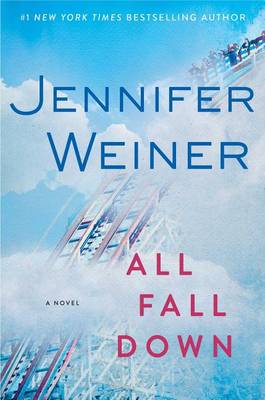Reviewed by Leah on
Drug addiction is a tough topic for me. I don’t really have an addictive personality (except for books, I can admit to being addicted to books) and I’m of the mind that doing drugs is a choice. Whether you like it or not, you have to choose to put that needle in your arm/take that pill/snort that powder etc. But I can admit that perhaps I have a rosy view, as it’s not something I’ve ever seen in real life, and you couldn’t honestly pay me to take a drug. So I was slightly concerned going in to the book that I would just feel like Allison was perhaps a bored wife, looking for any attention she can get. In fact, that’s quite the wrong view and I was very, very wrong, because Allison takes care of EVERYBODY in her life. She runs her house; she takes care of her super-sensitive daughter, Ellie; she’s the main breadwinner in her house since her husband’s job doesn’t pay all that well, and her blog posts do; her mom and dad are both struggling as her dad sinks further into dementia and I definitely felt like Allison was taking the brunt of everything, so it was actually super easy to see why a pill or two to take off the edge was the norm for Allison, and how it soon spiralled into more and more and more pills just to function every day.
Allison’s descent with the pills was actually really scary, because you could perhaps say it’s a different addiction to coke or heroin because you can quite easily be prescribed oxycotin and vicodin for pain meds. So it’s easier to become addicted, and much easier to hide. I spent most of the novel in fear for Allison, worried that she was going to take it too far (topped off by a very harrowing story from one of Ellie’s teachers about her daughter-in-law which sent shivers down my spine!). The scariest part is how well Allison was able to function on the pills – there were only one or two episodes where she seemed addled and out of it, and she was mostly in control of her body while high, able to do her blog posts and attend Ellie’s needs without seeming loopy or spacey. I was actually surprised by how much I liked Allison. I really felt for her – and while some may say a lot of people cope with what Allison copes with and don’t feel the need to become addicted to pills, I felt sympathetic towards her. She was surprisingly easy to like, despite her addiction, and her first-person narrative definitely helped.
It was quite rewarding to see both ends of the spectrum – we saw Allison’s descent, but we also got to see Allison’s struggle to come back to who she was, pre-pills and to see her trying to come off the pills and have a life where she can’t just pop a pill to make it all better. Weiner really covered all bases here in her novel, and I was impressed. I was also mightily impressed that Weiner made me care about the precocious Ellie. She sounded like SUCH a nightmare child in the beginning, throwing tantrums because smells were too smelly and noises too noisy (although I will cop to having sensitive ears and preferring quiet to noise) but she actually turned out to be very sweet and I loved the moments between Allison and her daughter – the dresses fighting to be worn, the bell in the diner that goes off when your food is ready, her sheer ability to see what no one else could see and to be empathetic when needed (which can’t have been easy for a child who’s used to getting her own way). I grew to adore the way she spoke and her emphasis on certain words, and her Ellie-way of being blunt and honest. I really enjoyed All Fall Down, and my only complaint is I was quite surprised by the ending. Because we were in a situation (that had my heart racing) and it just… ended. Which was disappointing. I felt like it needed an Epilogue, just to let us know how everything panned out in the end. But, other than that, I loved the book. It was super enjoyable, and Jennifer Weiner has once again proven what a fantastic writer she is.
Reading updates
- Started reading
- 27 May, 2014: Finished reading
- 27 May, 2014: Reviewed
